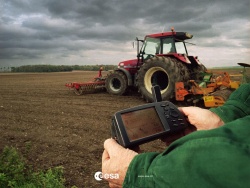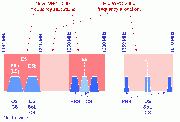If you wish to contribute or participate in the discussions about articles you are invited to contact the Editor
GALILEO Search and Rescue Service: Difference between revisions
| Line 25: | Line 25: | ||
[[File:Galileo 02 wp02.jpg|250px|Galileo Civil Application|right|thumb]] | [[File:Galileo 02 wp02.jpg|250px|Galileo Civil Application|right|thumb]] | ||
The Galileo support to the Search and Rescue service - herein called SAR/Galileo - shall: <ref name="GALHLD"> [http://ec.europa.eu/dgs/energy_transport/galileo/doc/galileo_hld_v3_23_09_02.pdf Galileo Mission High Level Definition], v3, September 2002.</ref> | The Galileo support to the Search and Rescue service - herein called SAR/Galileo -- represents the contribution of Europe to the international COSPAS-SARSAT cooperative effort on humanitarian Search and Rescue activities. SAR/Galileo shall: <ref name="GALHLD"> [http://ec.europa.eu/dgs/energy_transport/galileo/doc/galileo_hld_v3_23_09_02.pdf Galileo Mission High Level Definition], v3, September 2002.</ref> | ||
* Fulfil the requirements and regulations of the International Maritime Organization (IMO) - via the detection of Emergency Position Indicating Radio Beacons (EPIRBs) of the Global Maritime Distress Security Service and of the International Civil Aviation Organisation (ICAO) via the detection of Emergency Location Terminals (ELTs) | * Fulfil the requirements and regulations of the International Maritime Organization (IMO) - via the detection of Emergency Position Indicating Radio Beacons (EPIRBs) of the Global Maritime Distress Security Service and of the International Civil Aviation Organisation (ICAO) via the detection of Emergency Location Terminals (ELTs) | ||
* Be backward compatible with the COSPAS-SARSAT system to efficiently contribute to this international Search and Rescue effort. | * Be backward compatible with the COSPAS-SARSAT system to efficiently contribute to this international Search and Rescue effort. | ||
Revision as of 13:29, 13 April 2011
| GALILEO | |
|---|---|
| Title | GALILEO Search and Rescue Service |
| Author(s) | GMV |
| Level | Basic |
| Year of Publication | 2011 |
GALILEO Support to Search and Rescue Service (SAR) represents the contribution of Europe to the international COSPAS-SARSAT co-operative effort on humanitarian Search and Rescue activities. Galileo is to play an important part of the Medium Earth Orbit Search and Rescue system (MEOSAR). Galileo satellites will be able to pick up signals from emergency beacons carried on ships, planes or persons and ultimately send these back to national rescue centres. From this, a rescue centre can know the precise location of an accident. At least one Galileo satellite will be in view of any point on Earth so near real-time distress alert is possible. In some cases, feedback could be sent back to a beacon, something which is only made possible by Galileo.[1]
The COSPAR-SARSAT Mission
The International COSPAS-SARSAT Programme provides accurate, timely, and reliable distress alert and location data to help search and rescue authorities assist persons in distress. The objective of the Cospas-Sarsat system is to reduce, as far as possible, delays in the provision of distress alerts to Search and Rescue (SAR) services, and the time required to locate a distress and provide assistance, which have a direct impact on the probability of survival of the person in distress at sea or on land.[3]
To achieve this objective, Cospas-Sarsat Participants implement, maintain, co-ordinate and operate a satellite system capable of detecting distress alert transmissions from radiobeacons that comply with Cospas-Sarsat specifications and performance standards, and of determining their position anywhere on the globe. The distress alert and location data is provided by Cospas-Sarsat Participants to the responsible SAR services.
Cospas-Sarsat co-operates with the International Civil Aviation Organization, the International Maritime Organization, the International Telecommunication Union and other international organisations to ensure the compatibility of the Cospas-Sarsat distress alerting services with the needs, the standards and the applicable recommendations of the international community.
Galileo contribution (SAR/Galileo)
The Galileo support to the Search and Rescue service - herein called SAR/Galileo -- represents the contribution of Europe to the international COSPAS-SARSAT cooperative effort on humanitarian Search and Rescue activities. SAR/Galileo shall: [4]
- Fulfil the requirements and regulations of the International Maritime Organization (IMO) - via the detection of Emergency Position Indicating Radio Beacons (EPIRBs) of the Global Maritime Distress Security Service and of the International Civil Aviation Organisation (ICAO) via the detection of Emergency Location Terminals (ELTs)
- Be backward compatible with the COSPAS-SARSAT system to efficiently contribute to this international Search and Rescue effort.
Performance and features
The Galileo Commercial Service is based on adding two signals to the Open access signals. This pair of signals is protected through commercial encryption, which is managed by the service providers and the future Galileo operator. Access is controlled at the receiver level, using access-protection keys.
The Galileo Operating Company (GOC) will determine the level of performance it can offer for each commercial service together with ascertaining the demands of Industry and the needs of the consumer. It is intended to provide a guarantee for this service. The Commercial Service will be a controlled access service operated by Commercial Service Providers acting after a license agreement between them and the GOC. Commercial service providers will make decisions on the offered services: e.g. integrity data, differential corrections for local areas, etc… which will depend on the final characteristics of the other services offered by Galileo. [4]
To know more information about Performances of each Galileo Service see the article Galileo Performances.
Implementation and Applications
The Galileo Commercial Service signals will be the Open Services Signals, plus two encrypted signals (ranging codes and data), on the “E6” band. The implementation of this Service is not planned for the Initial Operational Capability (IOC) phase.[2]
Typical value-added services include service guarantees, precise timing services, the provision of ionosphere delay models, local differential correction signals for extreme-precision position determination and other services based on the broadcast of system information data.


